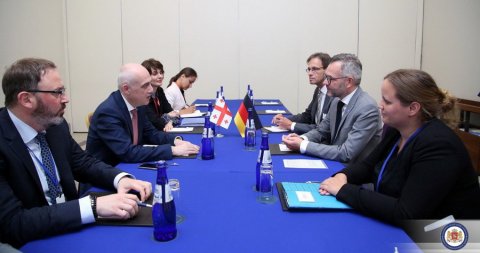Georgia, Germany And The EU: The 10th Anniversary Of The ‘Eastern Partnership’
The 16th Batumi Conference became an opportunity for Germany and Georgia met to discuss the future of the region
July 19th, 2019The 10th anniversary of the ‘Eastern Partnership’, a project launched to increase ties between six Eastern European states (Armenia, Azerbaijan, Belarus, Georgia, Moldova and Ukraine) and the European Union (EU) was commemorated with the 16th Batumi International Conference. It began on July 10, 2019, and concluded two days later. Initially launched to create an avenue for trade, joint economic policy, travel arrangements it has evolved into a wider political project advancing the relations between EU and its eastern partners. It has created an avenue for debate and discussion between western and eastern Europe to the Caucasus, creating a forum of intercultural debate and discussion.
This has led to the project becoming more ambitious, focusing on the consolidation of democracy, prosperity, stability and further cooperation. To achieve these aims, it has followed a comprehensive multilateral format which aims at result-oriented cooperation and to deliver concrete results. The conference assessed the results of the partnership, with the challenges in areas of security, territorial integrity and economic development were analyzed. The partnership was praised based on making the relations between the EU and the region “deeper, more structured and more predictable,” President of the European Council Donald Tusk said. He advocated the deepening of economic ties through the partnership, but was keen to emphasize how it “has allowed for contacts between our people to grow and deepen.”
Much of discussion focused on Russia and their involvement within the region, with Mr. Tusk declaring “You remember when the Russian President said in 2005: ‘we should acknowledge that the collapse of the Soviet Union was the greatest geopolitical catastrophe of the century.’ Today in Georgia I want to say loud and clear: the collapse of the Soviet Union was a blessing to Georgians, Poles, Ukrainians as well as to the whole of Central and Eastern Europe. And I’m convinced that also to Russians”, before stressing “Georgia needs solidarity inside the country too. Democracy is for development, not to spawn civil strife and war.”
The conference was used as an opportunity to further German and Georgian relations. Firstly, a meeting between the Deputy Foreign Minister of Georgia, Vakhtang Makharoblishvili, meeting with the German Ambassador to Georgia, Heike Peitsch, took place. They met along with deputies of German Bundestag, Johannes Schraps of the Social Democratic Party of Germany and Christoph Poll of Christian Democratic Union of Germany. They exchanged their opinions on priority areas of both governments and on strengthening bilateral cooperation. Simultaneously, the Vice President of the Bundestag, Claudia Roth, visited Georgia between the 8th to 12th of July. She met with the Georgian Prime Minister Mamuke Bakhtadze, the speaker of the Parliament Archil Talakvadze, along with civil society representatives and Georgian MPs. She used the conference to affirm her solidarity with the Georgian people and visited the area of South Ossetia. Using her Facebook page, she stated: "The military-backed occupation is only one instrument among many, with which Russia is trying to divert Georgia from its path to the rule of law and democracy, to EU rapprochement and partnership. It will be all the more important to denounce the Russian action in Abkhazia and South Ossetia unequivocally - and to fully support Georgia in the necessary reforms on the way to a modern constitutional state.”
Cultural links between Germany and Georgia stretch back over 200 years, with the immigration of Swabian farmers from 1817 onwards. At the outbreak of hostiles in 2008 in Georgia, Germany was one of the first to pledge humanitarian aid to Georgia and plays an active role in the European Union Monitoring Mission in Georgia. The German government has supported Georgia with aid for its humanitarian projects, seeking to support the reconstruction process and provide relief for refugees. The German stance on Georgia is clear, they are “keen to see Georgia and the region as a whole move closer to the European Union,” a goal they have supported through the ‘Eastern Partnership.’ Equally, Germany has funded huge amounts of funds to allow for development in the state, providing more than 1066 billion euros from 1992 onwards.
The conference laid bare the development and progression of the partnership, yet it also reveals the major challenges which still face the partnership.
References:
- - https://www.facebook.com/EmbassyOfGeorgiaInGermany/
- - http://www.batumiconference.ge/2019/en/news/16th-batumi-international-conference-dedicated-to-10th-anniversary-of-eastern-partnership
- - http://agenda.ge/en/news/2016/2177
- - https://www.portseurope.com/16th-batumi-international-conference-starts-in-georgia/
- - https://ec.europa.eu/neighbourhood-enlargement/news_corner/news/georgia%E2%80%99s-batumi-international-conference-%E2%80%93-celebrating-10-years-eastern_en
- - https://www.auswaertiges-amt.de/en/aussenpolitik/laenderinformationen/georgien-node/georgia/233028
- - https://www.consilium.europa.eu/nl/press/press-releases/2019/07/11/speech-by-president-donald-tusk-at-the-batumi-international-conference/


